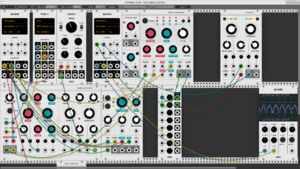VCVRack: Difference between revisions
mNo edit summary Tag: Reverted |
mNo edit summary Tag: Reverted |
||
| Line 28: | Line 28: | ||
== Overview == | == Overview == | ||
VCV Rack is a [[List of free software for audio|free]] [[open-source software|open-source]] virtual [[modular synthesizer]]: multiple modules can be connected to synthesize a sound. By default the software contains several [[Voltage-controlled oscillator|VCOs]], [[Low-frequency oscillation|LFOs]], mixers, and other standard synthesizer modules, however more can be added as plugins through the VCV Rack website. | VCV Rack is a [[List of free software for audio|free]] [[open-source software|open-source]] virtual [[modular synthesizer]]: multiple modules can be connected to synthesize a sound. By default the software contains several [[Voltage-controlled oscillator|VCOs]], [[Low-frequency oscillation|LFOs]], mixers, and other standard synthesizer modules, however more can be added as plugins through the VCV Rack website. | ||
Version 1.0.0 added a stable API, a multithreading engine | |||
Version 1.0.0 added a stable API, a multithreading engine and support for [[Polyphony and monophony in instruments|polyphonic signals]].<ref>{{cite web| url=http://cdm.link/2019/06/vcv-rack-free-modular-now-1-0/| title=VCV Rack hits 1.0; why you need this free modular now| editor=Peter Kirn| date=19 June 2019| website=cdm.link}}</ref> | |||
===Interconnectivity === | ===Interconnectivity === | ||
In addition to the above features, VCV rack can also connect to other hardware and software by outputting analog [[CV/gate]] and digital [[USB]] or [[MIDI]] signals. The software can also connect to other VST plugins though the module [https://vcvrack.com/Host.html "host"]; the ability to use VCV rack as a VST plugin itself was a feature that has been deprecated but is expected to return shortly after the release of Rack v2. | In addition to the above features, VCV rack can also connect to other hardware and software by outputting analog [[CV/gate]] and digital [[USB]] or [[MIDI]] signals. The software can also connect to other VST plugins though the module [https://vcvrack.com/Host.html "host"]; the ability to use VCV rack as a VST plugin itself was a feature that has been deprecated but is expected to return shortly after the release of Rack v2. | ||
*[https://vcvrack.com/ VCV Rack website] | *[https://vcvrack.com/ VCV Rack website] | ||
Revision as of 04:01, 27 August 2021
 VCV Rack 0.6.2c | |
| Original author(s) | Andrew Belt |
|---|---|
| Stable release | 1.1.6
/ 4 November 2019[1] |
| Repository | github |
| Written in | C++ |
| Engine | |
| Operating system | Linux, macOS, Microsoft Windows |
| Type | modular synthesizer |
| License | GPL license V3[2] and proprietary for some graphics and 3rd party modules |
| Website | vcvrack |
VCV Rack is a free and open-source cross-platform software modular synthesizer.
Overview[edit]
VCV Rack is a free open-source virtual modular synthesizer: multiple modules can be connected to synthesize a sound. By default the software contains several VCOs, LFOs, mixers, and other standard synthesizer modules, however more can be added as plugins through the VCV Rack website.
Version 1.0.0 added a stable API, a multithreading engine and support for polyphonic signals.[3]
Interconnectivity[edit]
In addition to the above features, VCV rack can also connect to other hardware and software by outputting analog CV/gate and digital USB or MIDI signals. The software can also connect to other VST plugins though the module "host"; the ability to use VCV rack as a VST plugin itself was a feature that has been deprecated but is expected to return shortly after the release of Rack v2.
- ↑ "Releases". Github. Retrieved 29 September 2019.
- ↑ https://github.com/VCVRack/Rack/blob/v1/LICENSE-GPLv3.txt
- ↑ Peter Kirn, ed. (19 June 2019). "VCV Rack hits 1.0; why you need this free modular now". cdm.link.